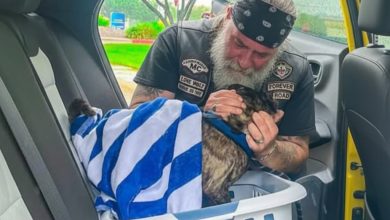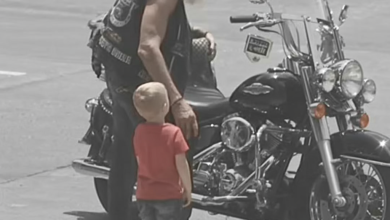The friends were relaxing on the beach when suddenly a dog ran up to them and started barking loudly: one of the women suddenly turned pale as she looked carefully at the dog’s fur
Five lifelong friends lounged on the beach, basking in the warmth of a golden summer afternoon. Spread out on soft blankets, they shared stories, laughter, and quiet moments of reflection as the waves whispered nearby. A basket beside them brimmed with homemade cookies, fresh fruit, and chilled drinks—simple pleasures for a well-earned day of rest.
Suddenly, a dog appeared.
It was a medium-sized mutt with tousled reddish fur and sharp, alert eyes. It bounded toward the group, barking loudly and circling them with restless energy. Its tail wagged, but something about its movements felt off—urgent, almost frantic.
“Look how cute!” one woman laughed, offering a cookie.
“Must be hungry,” another added, tossing a treat.
But the dog ignored the food. It kept barking, weaving between them, louder and more insistent with each pass. The women exchanged uneasy glances.
Then one of them gasped and went pale.
“Girls… look at its fur.”
She pointed with a trembling hand. Between the tufts of fur were dark, wet stains—blood.
They leaned in, stunned. The dog’s paws and side were streaked with fresh blood, yet it showed no signs of injury. No limp, no whimper. Just urgency.
Without warning, the dog bolted toward a rocky outcrop at the edge of the beach.
The women hesitated only a moment before following, hearts pounding as they scrambled across the hot sand. The dog led them to a narrow sandbank, where the tide gently lapped at the shore.
There, lying motionless, was a man.
His head rested in a pool of blood, a slick stone beside him—he must have slipped and struck it. The dog rushed to his side, barking again, desperate for help.
One woman knelt beside him, her voice shaking: “Is he breathing?”
“Barely,” another whispered, pressing her hand to his chest.
With trembling fingers, one of them called emergency services, describing the scene. They did what they could—comforted the dog, kept the man conscious, and waited.
The same thought echoed in each of their minds:
If not for this dog, they would never have known.
Minutes later, the wail of an ambulance broke the stillness. Paramedics arrived, carefully lifted the man onto a stretcher, and began treatment. The women watched, relieved, as the professionals took over.
And the dog—finally—relaxed. It walked over to one of the women and gently nudged her hand, accepting a soft stroke across its head. As if to say:
Thank you.




